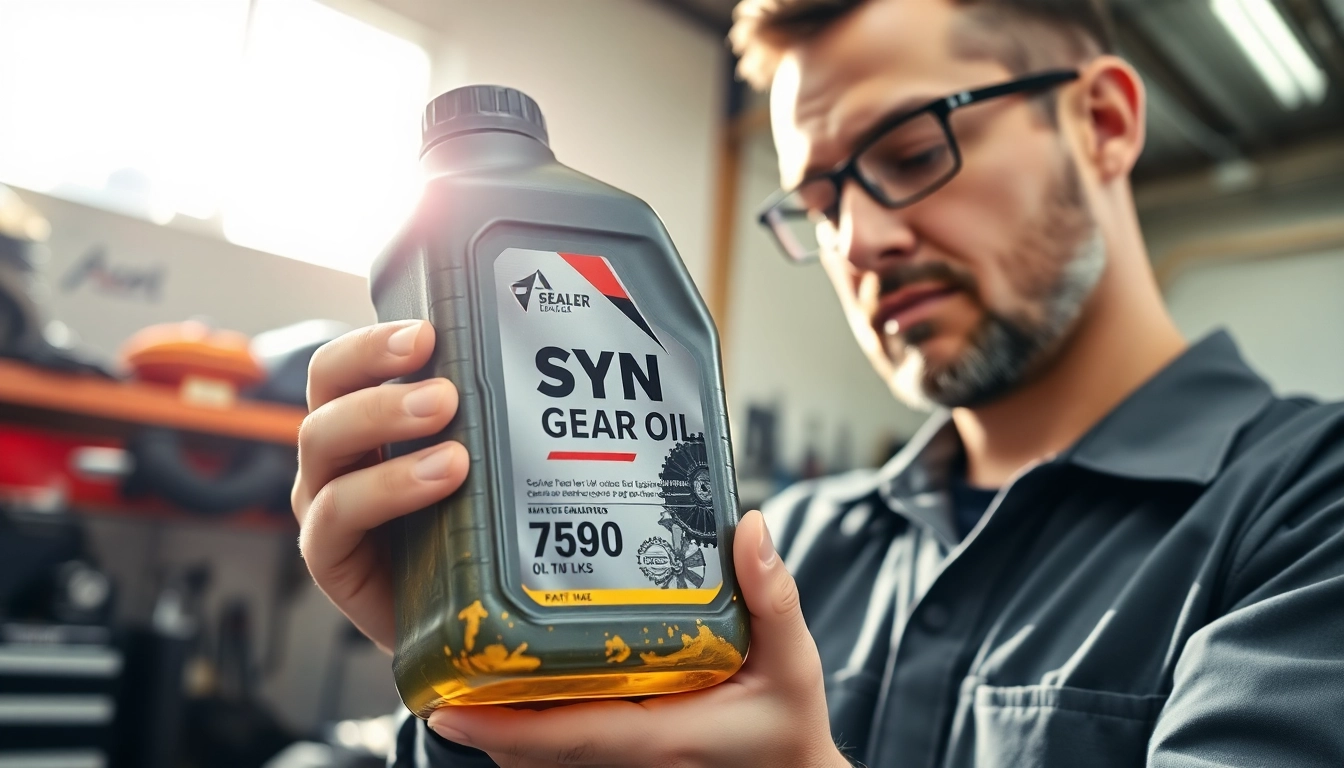Understanding Syn Gear Oil 75W90
What is Syn Gear Oil 75W90?
Synthetic gear oil, particularly the syn gear oil 75W90, is a specialized lubricant designed for high-performance conditions in the automotive and industrial sectors. This formulation primarily consists of synthetic base oils and a combination of additives aimed at enhancing performance across various applications. Unlike conventional mineral oils, synthetic gear oils exhibit superior thermal stability, reduced volatility, and improved lubricating properties, making them ideal for heavy-duty applications.
Key Properties of 75W90 Gear Oil
The “75W90” designation signifies a viscosity rating, where ’75W’ refers to its performance in colder temperatures and ’90’ indicates its viscosity at higher temperatures. This dual-range performance allows it to function effectively across a variety of environmental conditions. Key properties of 75W90 gear oil include:
- High Film Strength: Provides an effective lubrication layer between metal surfaces, minimizing wear and extending gear life.
- Excellent Thermal Stability: Maintains its viscosity over a wide temperature range, which is critical for reliability in extreme conditions.
- Enhanced Oxidation Resistance: Resists breakdown and sludge formation, ensuring cleaner operation and improved reliability.
- Low Pour Point: Facilitates smooth operation even in cold conditions.
Applications of Syn Gear Oil 75W90
This type of synthetic gear oil is versatile, making it suitable for various applications, such as:
- Automotive Transmissions: It’s commonly used in manual transmissions and differentials.
- Industrial Gearboxes: Suitable for high-load applications where metal-on-metal contact may occur.
- Heavy Machinery: Necessary for vehicles and equipment in severe operating conditions, including construction and mining.
- Commercial Vehicles: Its high-performance properties are crucial for trucks and buses subjected to heavy loads and long distances.
Advantages of Using Synthetic Gear Oil
Enhanced Performance in Various Conditions
Using synthetic gear oil, particularly 75W90 formulations, offers advantages over conventional oils. Their ability to maintain viscosity under extreme temperatures ensures consistent performance. Whether in freezing winters or scorching summers, synthetic gear oils adapt, providing stable lubrication that keeps machinery running smoothly.
Longevity and Protection Offered by Syn Gear Oil 75W90
One of the standout features of synthetic gear oils is their ability to extend gear life. The high film strength reduces friction and wear, meaning that machinery can operate for longer periods without requiring frequent oil changes. This increased longevity directly correlates with reduced maintenance costs and downtime.
Cost-Efficiency Over Time
While synthetic gear oils might have a higher upfront cost compared to conventional oils, their long-term benefits often outweigh initial expenditures. The reduced frequency of oil changes and lower risks of component failure contribute to significant cost savings over time. For businesses reliant on machinery, the investment in synthetic oils like 75W90 can be particularly beneficial.
Choosing the Right Syn Gear Oil 75W90
Important Factors to Consider
When selecting a synthetic gear oil, consider the following factors:
- Manufacturer Recommendations: Always refer to the equipment manufacturer’s specifications for the required viscosity and oil type.
- Performance Requirements: Evaluate what intense conditions the oil will be subjected to, including loads and temperatures.
- Chemical Composition: Look for oils that feature advanced additive packages which enhance performance.
Top Brands and Their Offerings
The market offers several reputable brands that produce high-quality syn gear oil 75W90. Here are a few notable mentions:
- Mobil 1: Known for its premium synthetic formulations.
- AMSOIL: Specializes in high-performance lubricants for diverse applications.
- Chevron: Offers a range of synthetic gear oils that cater to various operational demands.
- Valvoline: Provides advanced full synthetic oils suitable for high-pressure environments.
How to Read Gear Oil Labels
Understanding gear oil labels is essential for selecting the right product for your needs. Look for key terms and ratings:
- Viscosity Ratings: AS indicated, higher numbers represent oil that performs better at high temperatures.
- API and SAE Ratings: Ensure oils meet the American Petroleum Institute (API) standards and follow Society of Automotive Engineers (SAE) specifications.
- Additives: Check for additional performance modifiers like anti-wear agents, extreme pressure additives, and rust inhibitors.
Installation and Maintenance Tips
How to Properly Change Your Gear Oil
Changing gear oil is critical for maintaining optimal performance. Follow these steps for an efficient change:
- Gather necessary tools and materials, including the new oil, a drain pan, and wrenches.
- Warm up your vehicle slightly to help facilitate oil flow.
- Locate the oil pan and drain the old oil completely.
- Replace the oil filter if applicable, and ensure any old gasket material is removed.
- Fill the cavity with the new synthetic gear oil, observing recommended volume.
- Run the vehicle briefly and check for leaks before disposing of the old oil responsibly.
Maintaining Gear Consistency with Syn Gear Oil 75W90
To ensure optimal performance and long life for your gear systems, consistency in oil type is key. Avoid mixing different oils, as this can compromise performance and lubrication characteristics. Stick to the same supplier and product specifications whenever possible.
Signs Your Gear Oil Needs Changing
Awareness of the signs indicating a need for gear oil replacement can help prevent costly repairs:
- Unusual noises: Grinding or whining sounds during operation can indicate insufficient lubrication.
- Overheating: Excess heat can signify that the oil has broken down or is no longer providing adequate protection.
- Contamination: Cloudy or dirty oil can indicate the presence of moisture or other contaminants which necessitate a change.
Common Myths About Synthetic Gear Oils
Debunking Myths Surrounding Syn Gear Oil 75W90
Several misconceptions about synthetic oil persist, often discouraging users from maximizing their benefits. Some common myths include:
- Myth 1: Synthetic oils cause leaks. In reality, they can help seal existing leaks due to their superior fluidity.
- Myth 2: They are just a marketing gimmick. The science behind synthetic formulations truly offers enhanced performance.
- Myth 3: Switching to synthetic oils from conventional oils is always risky. Properly formulated synthetic oils often surpass conventional standards, promoting enhanced lubrication.
Comparative Analysis with Conventional Oils
Synthetic gear oils like 75W90 outperform conventional oils in numerous aspects:
- Temperature Stability: Synthetic oils maintain their viscosity better under high and low-temperature extremes.
- Oxidation Resistance: Synthetic gear oils resist degradation, leading to less oil breakdown over time.
- Cleanliness: They produce fewer deposits, leading to cleaner gear compartments compared to their conventional counterparts.
Expert Opinions on Synthetic vs. Conventional Gear Oils
Many automotive experts endorse synthetic oils for their numerous advantages. Industry leaders point out that synthetic oils provide not only protection but also enhance equipment efficiency through better lubrication. With fewer breakdowns and extended service intervals, the transition to synthetic formulations is often seen as a modern necessity in advanced machinery and vehicles.



